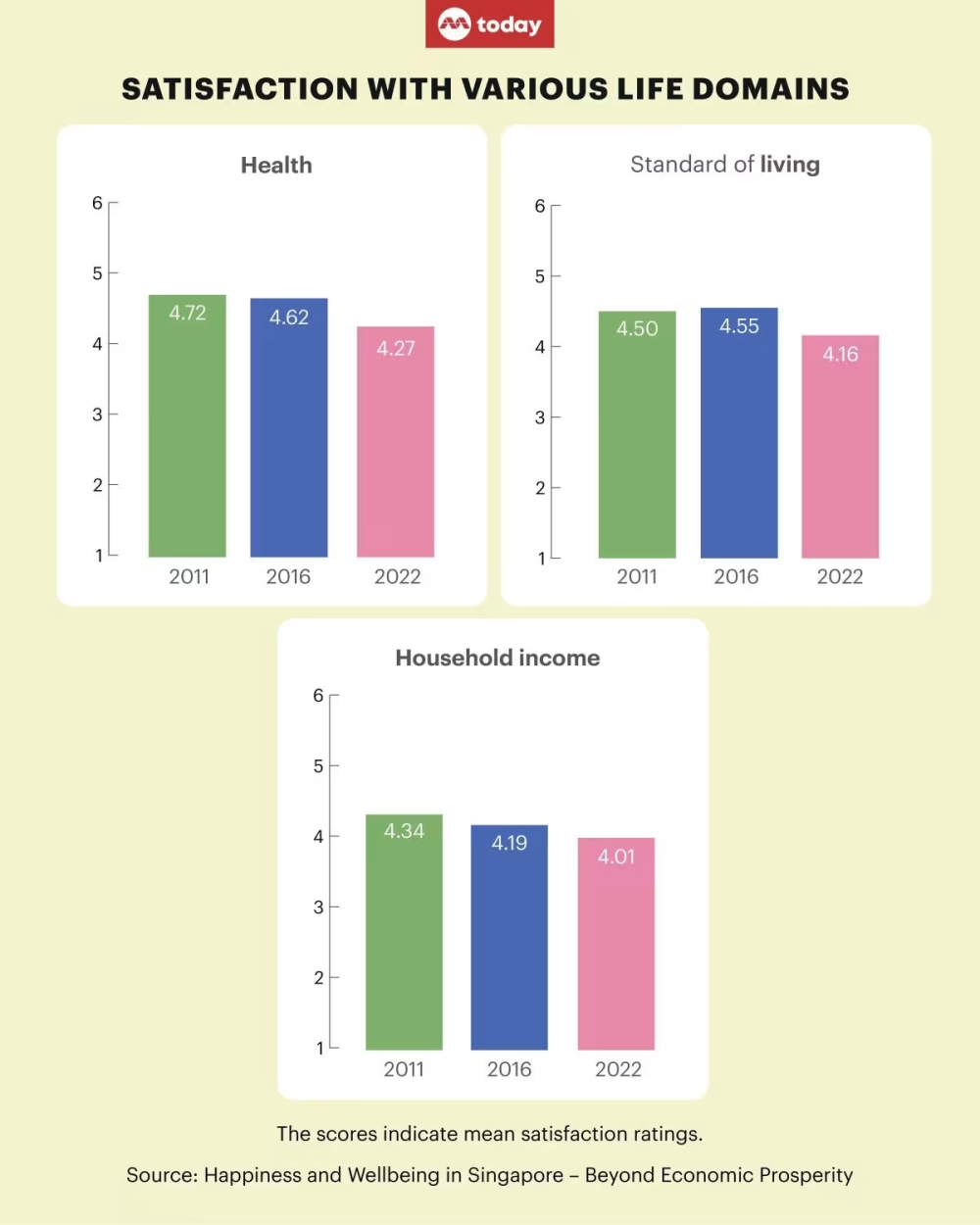SINGAPORE, Jan 13 — Singaporeans are less happy today compared to five years ago, although those who have a more balanced view of life were generally more satisfied, a survey by the National University of Singapore (NUS) found.
The 2022 Quality of Life survey also found that from 2016 to 2022, Singaporeans have enjoyed life less, and have felt a decreased sense of achievement, control and purpose.
The survey polled 1,905 Singaporeans aged between 21 and 79 from June to July 2022. It is the third and latest edition of a longitudinal study, with earlier editions done in 2011 and 2016.
The NUS researchers acknowledged the impact that the Covid-19 pandemic could have on Singaporeans’ well-being, and asked respondents to reflect on the last two years of the pandemic — between mid-2020 and mid-2022 — as they answered the questions in the 2022 survey.
The survey found a correlation between high incomes and happiness, although this is not always the case. There were exceptions where people with higher household incomes reported lower levels of well-being than those in lower household income brackets.
For the survey, participants were asked to rank the importance of nine values:
- Sense of belonging
- Excitement
- Fun and enjoyment in life
- Warm relationships with others
- Self-fulfilment
- Being well-respected
- Sense of accomplishment
- Security
- Self-respect
Singaporeans consistently gave the lowest priority to “excitement” across the three surveys in 2011, 2016 and 2022.
These findings were published in a book launched on Thursday (Jan 11), titled Happiness and Wellbeing in Singapore — Beyond Economic Prosperity.
It was authored by Associate Professor Siok Kuan Tambyah, honorary fellow Tan Soo Jiuan and PhD candidate Yuen Wei Lun from the NUS Business School.
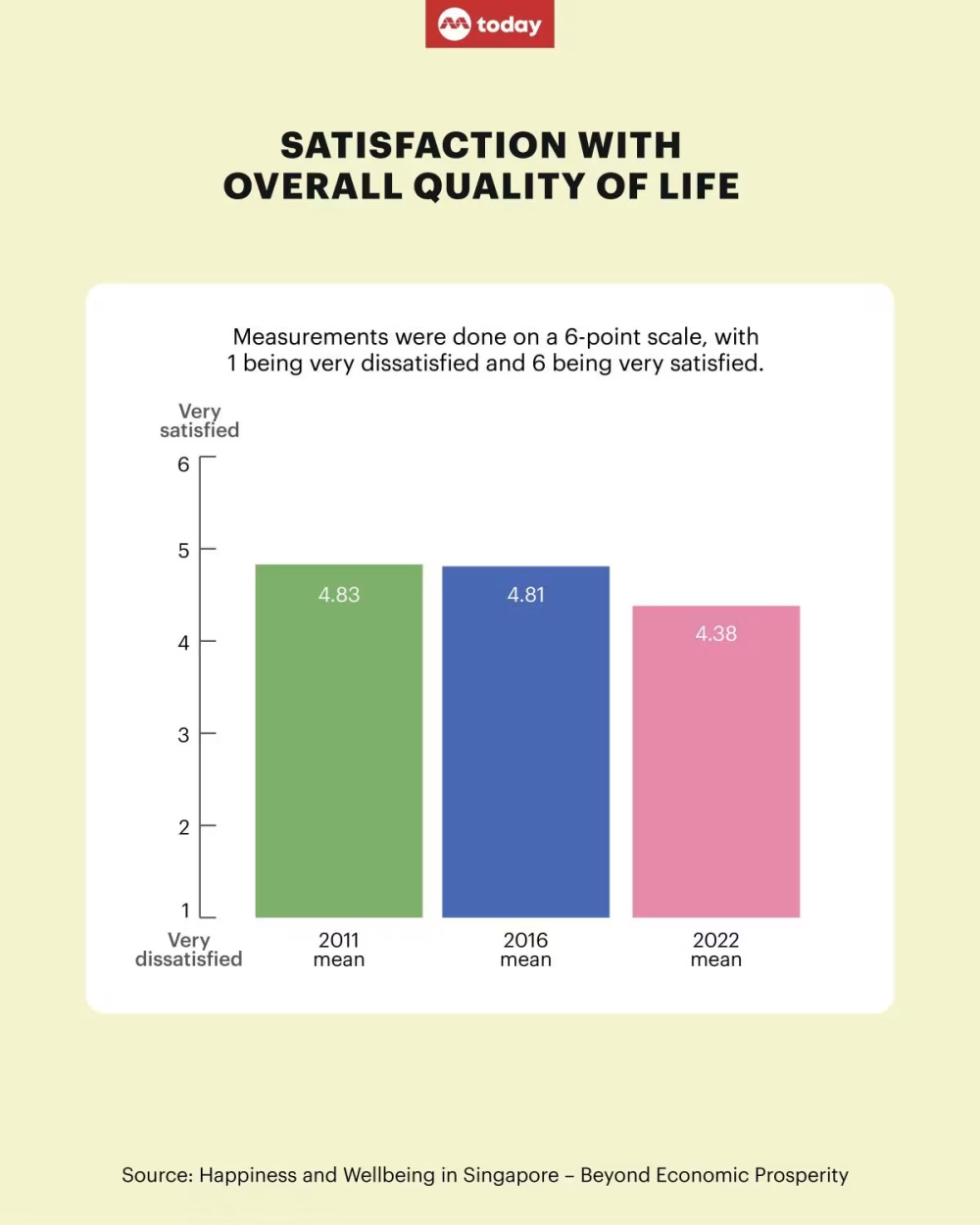
Why it matters
As research on well-being has been ongoing for many years globally, various concerns — from the economics of happiness to eudemonics, or the theory of happiness — have been raised in academic circles and in the policy-making arena.
Researchers involved in well-being research have noted the limitations of using certain measurements — such as the gross domestic product and gross national product — as indicators of quality of life, given that some aspects of well-being cannot be accounted for with economic prosperity, the NUS academics wrote in their book.
“We also recognise these limitations in a relatively wealthy country like Singapore, and the need for a more holistic perspective of well-being,” they said.
Their quality of life surveys thus incorporate “validated measures” used in other research studies and context-specific measures, to allow for comparisons across countries and across years within Singapore respectively.
The datasets for the surveys also provide indicators of well-being that are relevant to Singaporeans for more in-depth analyses, the NUS academics said.
In the conclusion of their book, the authors wrote: “While results of the 2022 Quality of Life survey painted a gloomy picture of declining well-being among Singaporeans, there are some bigger takeaways that we hope readers could glean from this book.
“One key point to note, among many others, is that while there are some established routes to improve one’s life satisfaction or affective well-being, there is also room for many different pathways to happiness.
“By understanding what truly makes us happy, all of us can cultivate and integrate positive mindsets and practices in our daily lives that enhance our well-being.”
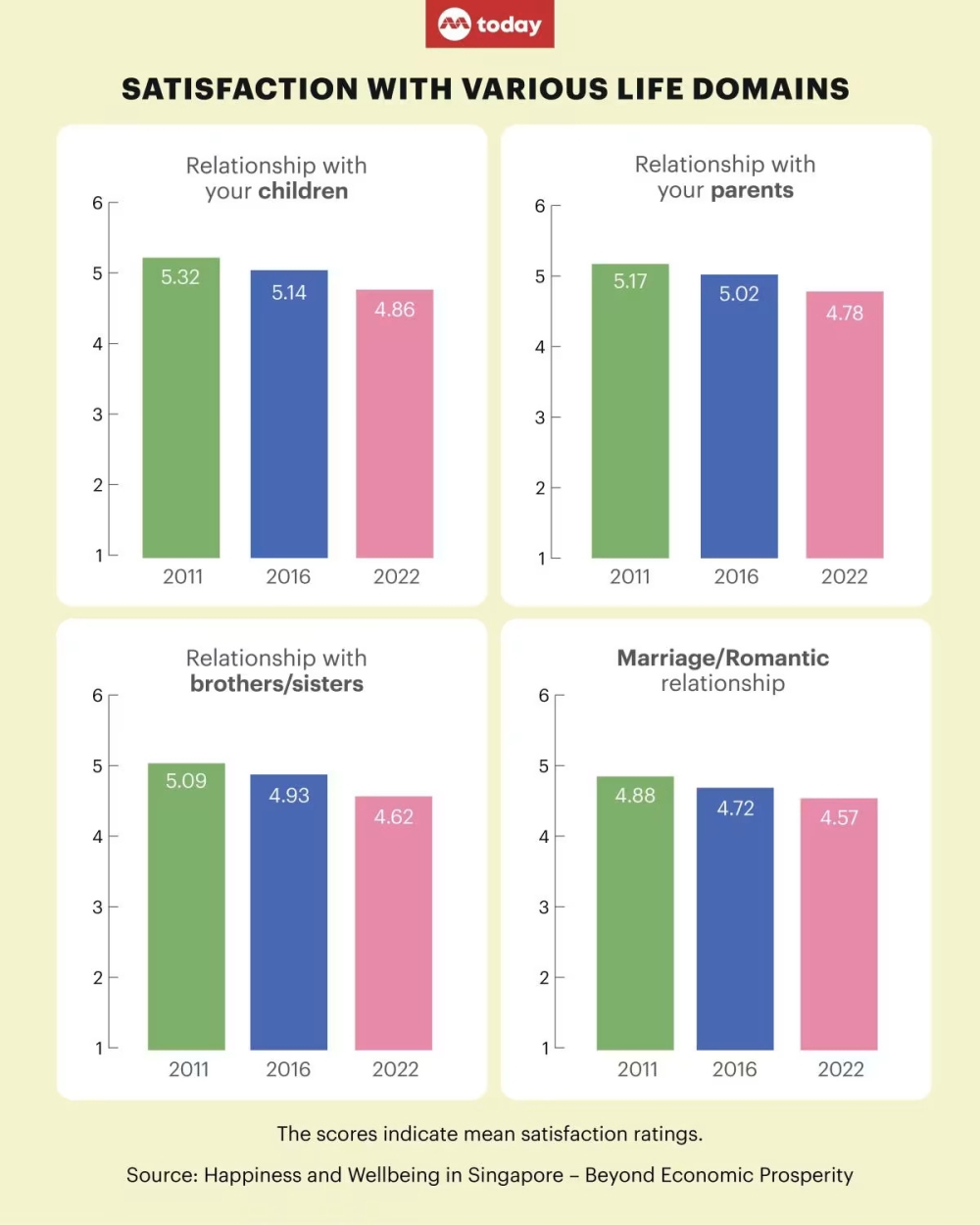
What contributes to Singaporeans’ well-being
The study evaluated Singaporeans’ well-being using cognitive and affective approaches.
The cognitive approach involves a self-evaluation of one’s quality of life, while the affective approach looks at one’s frequency of experiencing positive emotions.
The metrics for evaluation include measuring the person’s satisfaction with:
- 15 life domains (such as housing, relationships and education attained)
- Aspects of their affective well-being (including happiness, enjoyment and achievement)
- Economic well-being
- Personal values
- Value orientations
- Views on democratic rights
The respondents’ satisfaction with their overall quality of life consistently declined across the three surveys.
The mean satisfaction rating with one’s overall quality of life was 4.38 in 2022, compared with 4.81 in 2016 and 4.83 in 2011 — with a higher index indicating a higher satisfaction level.
Out of the 15 life domains, the top eight “most satisfied” domains were highly consistent across the three surveys conducted over a period of 11 years.
In all three surveys, Singaporeans were most satisfied with their relationship with their children, followed by their relationship with their parents, and then their siblings.
Singaporeans’ satisfaction with their household incomes consistently ranked lowest across the three surveys.
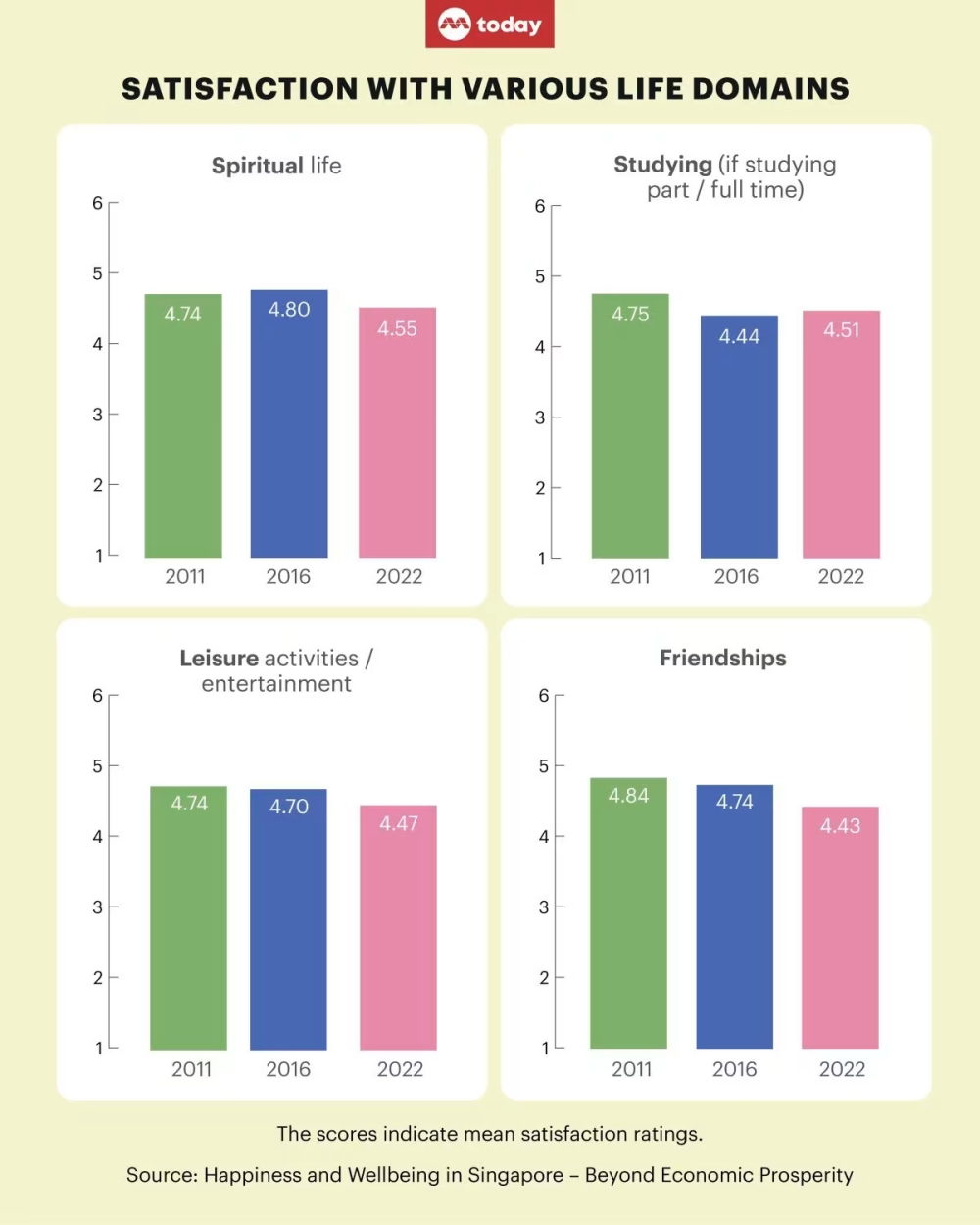
Does more money mean greater happiness?
Overall, the survey found a positive relationship between Singaporeans’ household income and their satisfaction with life and overall quality of life.
Respondents’ levels of happiness, enjoyment, achievement, sense of control and purpose increased with higher household incomes.
However, there were exceptions.
Even though happiness generally seemed to rise as household incomes increased, the survey found instances where Singaporeans in a higher income group reported lower levels of happiness than those in a lower income group.
For example, respondents in the bracket with a monthly household income of between S$11,000 and S$11,999 had a mean happiness index of 2.32, while respondents in the bracket with a monthly household income of between S$9,000 and S$9,999 reported a mean happiness index of 2.42.
On this, the survey found that Singaporeans’ perceptions of their socio-economic status — over actual income — and their financial satisfaction had moderate to strong correlations with their well-being.
“Thus, we can surmise that satisfaction with one’s socio-economic status is an important driver of economic well-being and not necessarily the particular levels of income, although those with higher household incomes were more financially comfortable,” the NUS academics said in their book.
Still, they acknowledged that some income brackets had smaller numbers of respondents and the observations — while demonstrating a correlation — “should be taken with a note of caution and... do not suggest any causality”.
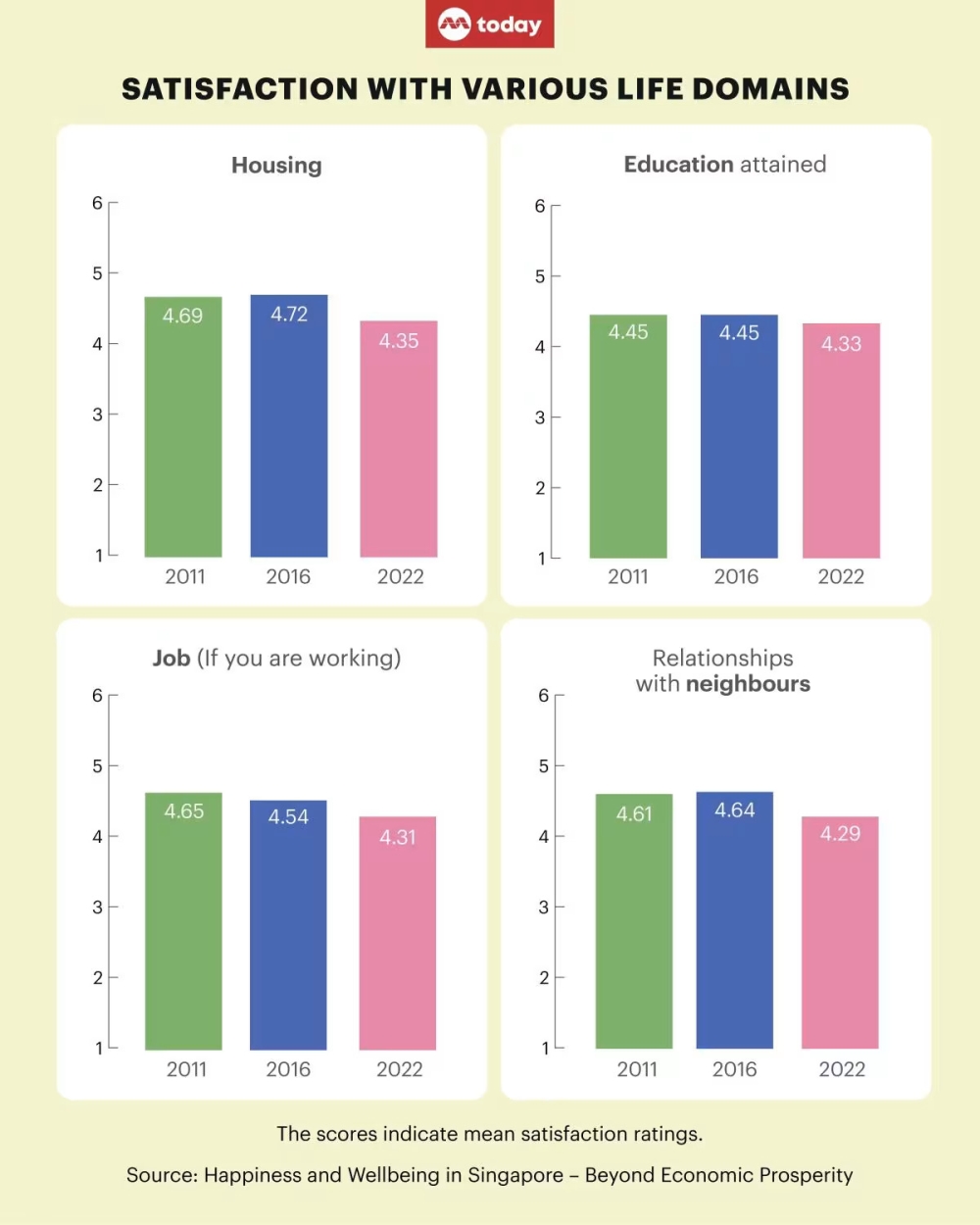
Singaporeans’ perceptions of their democratic rights
To study the association between perceptions of democratic rights and their impact on Singaporeans’ well-being, respondents were polled on their levels of satisfaction across six metrics:
- The right to vote
- The right to participate in any kind of organisation
- The right to gather and demonstrate
- The right to be informed about the work and functions of the Government
- The right to freedom of speech
- The right to criticise the Government
Consistent with findings from the 2011 and 2016 surveys, the 2022 study found that among the six democratic rights measured, Singaporeans were most satisfied with the right to vote and least satisfied with their right to criticise the Government.
Older respondents were found to be less satisfied with their democratic rights, with those between 70 and 79 years old recording the lowest mean scores for four out of six rights.
The survey also found that — apart from the right to gather and demonstrate — satisfaction with all the other five democratic rights had a significant and positive influence on Singaporeans’ satisfaction with life.
And although respondents were found to be least satisfied with their right to criticise the Government, this metric had the strongest influence — among the six markers — on how satisfied Singaporeans were with their quality of life. — TODAY
